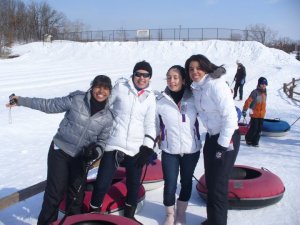SLEDDING SAFETY TIPS from the Minnesota Safety Council
CHOOSING A SLED
Look for solid construction – avoid homemade sleds, inflatable sleds that could be punctured, and equipment with sharp edges. Energy-absorbing seat pads will help cushion jolts to the spine.
Examine sleds to be sure handholds are secure and steering works easily.
FINDING A SAFE SLEDDING LOCATION
Look for an area that has been designated as a safe place to sled. Injuries are most likely to occur on poorly lit, unsupervised hills with obstacles such as rocks, tree trunks, etc. Check for signs posted by local police or parks and recreation departments.
Check that the sledding area has adequate space at the bottom to allow the sled to come to a complete stop. It should be far from traffic and water, and free of obstacles such as rocks and trees.
Be alert to hidden hazards under mounds of snow.
Don’t let children sled on ice.
Provide adult supervision as appropriate for children’s age and abilities.
Before sledding, remind children of the basics: Encourage them to sit up with feet forward (lying flat on the sled increases the chance of head and abdominal injuries), and to roll off the sled if they’re about to collide with a tree or other large or hard object.
Dress children appropriately for the temperature and in multiple layers. Outerwear should be water- and wind-resistant and free of drawstrings, which could pose a strangulation hazard.
It is recommended that kids wear helmets when they sled. Although a helmet has not yet been designed specifically for sledding, until such a helmet exists, wearing a bicycle, skateboard or ski helmet may be preferable to wearing no helmet at all.
Source: Safe Kids Worldwide

